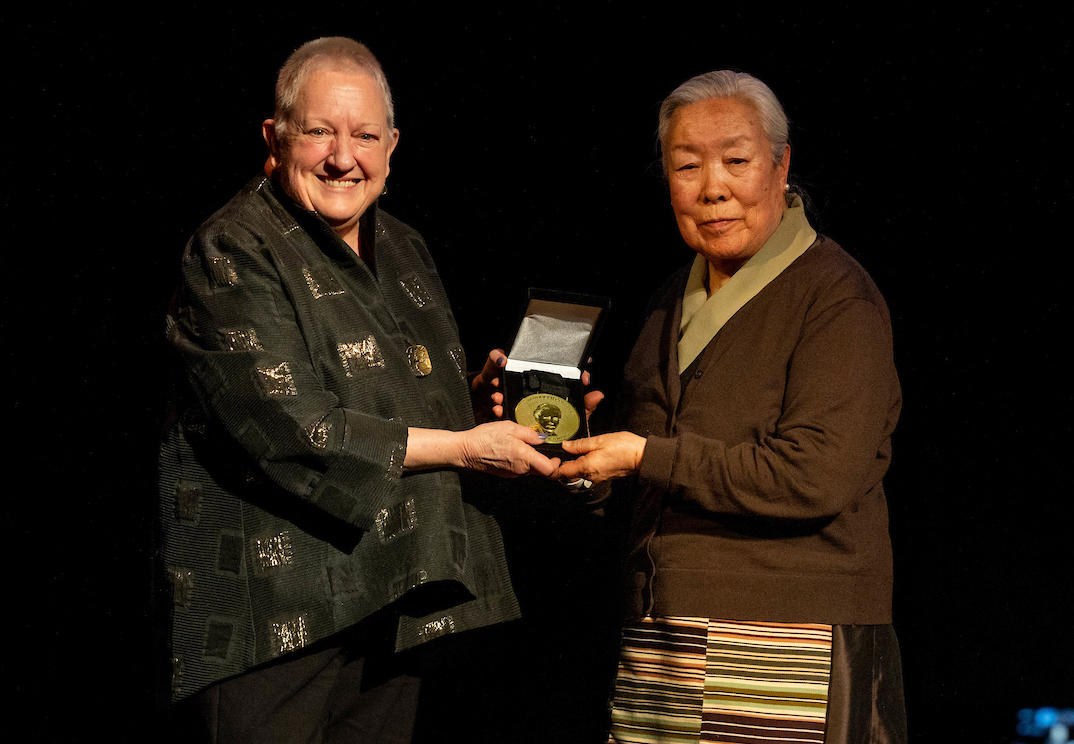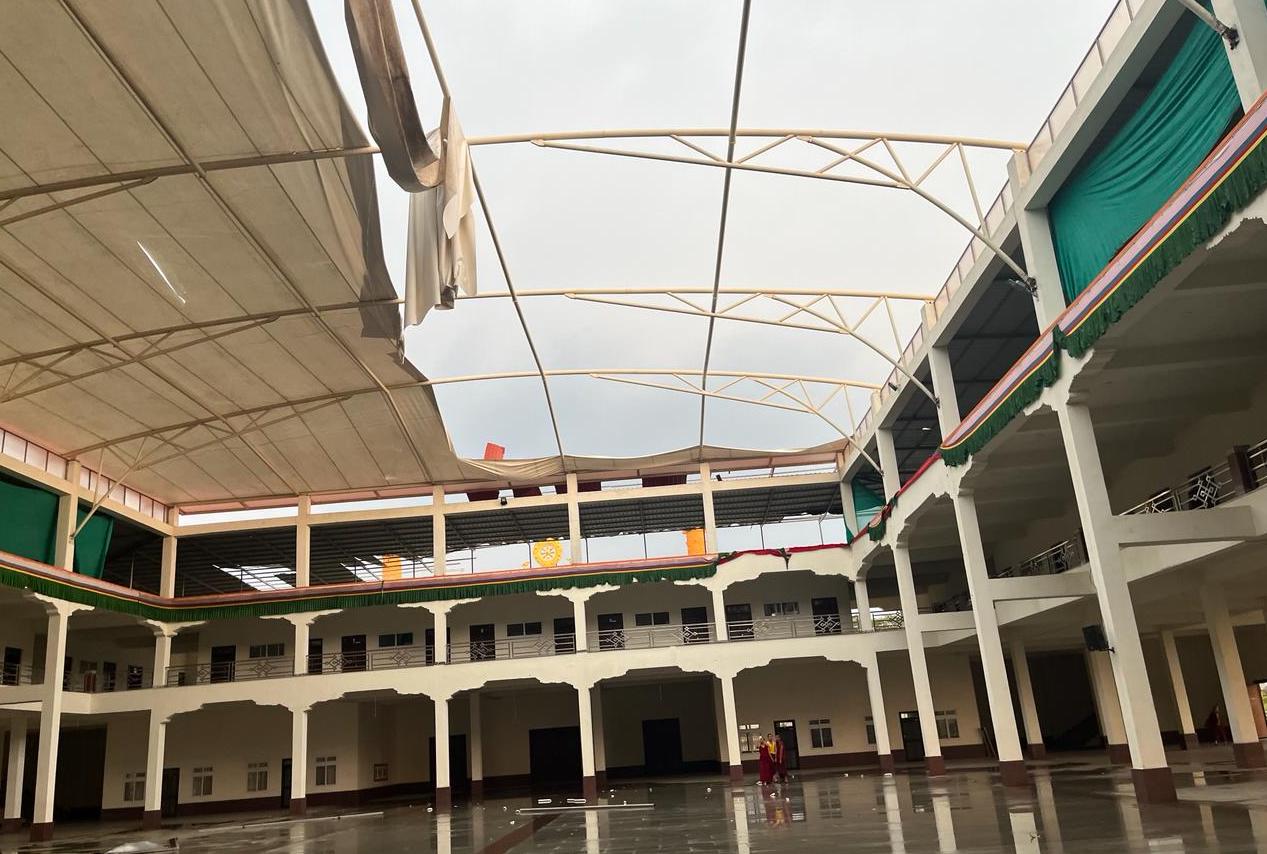The railway from Beijing to Tibet isn’t that fast, but it carries away resources as quickly as it brings in all the woes of modernity
 Sky Train: Tibetan Women on the Edge of History
Sky Train: Tibetan Women on the Edge of History
By Canyon Sam
Published by Silkworm Books
Available at Asia Books and other leading bookstores, Bt695
Reviewed by Manote Tripathi
Lhasa is usually closed to tourists in March, a sensitive month for the Tibetan Autonomous Region because it brings the anniversary of “the National Tibetan Uprising”. Last month was the 51st anniversary and, as usual, there was an abrupt drop in the flow of visitors – more than two million visit Lhasa every year, along with Han Chinese, Hui Muslims and others who set up shop for them.
The “sky train” in the title of this book is the Qinghai-Lhasa railway and all of its important economic and colonial overtones. It brings to Tibet less-than-welcome outsiders from as far away as Beijing, and with them the Chinese culture, language, economic development and ways of thinking and doing business.
In March 2008 the largest protests since the 1960s broke out across the region ahead of the Beijing Olympics. The Chinese intruders in the “holy city”, a minority seen as a threat to Tibetans’ cultural identity, were attacked and saw their shops in Lhasa burned down.
A third-generation Chinese-American, born and bred in San Francisco, Canyon Sam traces these developments and brings Tibetan history into perspective at a critical juncture.
She shows that Tibetan apprehensions are quite natural and somewhat laudable, and that the Chinese in Lhasa are, on the whole, greedy and disrespectful of their hosts.
Sam has visited Tibet twice, first in 1986, when Tibet again reopened to foreigners, and again in 2007 just after the train service was introduced. There to study the lives of Tibetan women, she returned from both visits a Tibetan advocate.
It’s not unlike an Israeli visiting the Gaza Strip and becoming a supporter of the Palestinian cause, though Sam admits “little affinity for China before I’d first visited”.
She found the Chinese “rude and unhelpful – contemptuous and envious”. Instead of a model socialist society, she found “Orwell mixed with Dickens”.
She was more at ease in relaxed and spacious Tibet in 1986, before Lhasa saw its first power lines and cars. Amid the Tibetan humour, openness and generosity, Sam read John Avedon’s award-winning book “In Exile from the Land of Snows” and learned of the brutality that had befallen them.
“Sky Train” portrays life since the 1950s through the eyes of four older women and explains the conditions that led to violence. The women recount bloody episodes following China’s invasion, when northeastern Kham province was attacked from all directions.
In 1959 Mao Zedong ordered 40,000 People’s Liberation Army troops to proceed into Lhasa, then predominantly a city of women, as the author points out. Most of the men had joined the resistance forces in the countryside, while others had been expelled in a series of purges.
The women proved to be capable campaigners for independence. About 20,000 gathered in front the Potala Palace on March 12, 1959, to protest against the Chinese occupation – and were met with brute force. Many were beaten to death or sent to forced-labour camps modelled after Soviet gulags.
In their accounts of these prisons, including the political “re-education”, the Han Chinese are bloodthirsty and spiritually hollow.
There are tales as well of the Cultural Revolution from 1966 to 1976, when ideologically crazed Red Guards smashed “the Four Olds”, in the process destroying 90 per cent of Tibet’s monasteries.
The author is a student of Buddhism and shares with her interviewees an utter lack of resentment toward Mao and his subordinates. But I can’t help wondering whether she dislikes most the Chinese residents of Lhasa in the 1950s or those who are there now.
The way Tibetans have dealt with the Chinese is a question that looms over the book. They were victims for the most part, but clearly lacked what it takes to cope with change in the modern world. They were riddled with anxiety and uncertainty over Beijing’s intentions for Tibet.
Namseling was the wife of a high government official in Lhasa who the Chinese sent to Kham to urge resistance forces to lay down their arms. Instead he joined them.
After confiscating her home, the army humiliated Namseling and other officials’ wives in the streets, making them carry trays of toiletries behind soldiers beating drums and shouting, “We will kill those who lived off the fat of other people’s labour!”
Namseling was sentenced to 10 years in prison, lived in solitary confinement and laboured 12 hours a day carrying bricks up mountains to build hydroelectric dams. A fellow prisoner was put to death for praying for the Dalai Lama.
Canyon Sam praises Tibetan women for their rock-solid strength, courage, resilience – and sense of acceptance – but she fears they are entering a new era too soon. The memory of Chinese atrocities hasn’t faded, and the train from Beijing bringing the promise of economic development and social progress is seen as “China’s Final Solution” – doom for the Tibetans.
Sam claims China is robbing Tibet via the railroad of an estimated US$80 billion worth of mineral reserves. The Tibetans who built the tracks were paid 25 yuan per day, half the wage of the Chinese who laboured beside them.
It is perhaps the author’s interpretation of China’s motives that will prove the most contentious. Amid scant first-hand Chinese views about the railroad and its impact on Tibet, Sam recalls an announcement on the train in perfect English:
“Dear passenger,” the male voice said, “the Qinghai-Tibet Railway is sure to bring development in a more rapid, scientific and harmonious way to Tibet.”
Sam says China is “transplanting” itself to Tibet, with modern buildings, gaudy guesthouses and streets renamed – the main avenue is now Beijing Road – and choked with traffic so it “resembles a scene in downtown Bangkok”. English signs on the train misspell Lhasa as “Lasa”.
Is there hope? Can Buddhism and the Tibetan language survive alongside modern education in the schools? That remains to be seen.
In the meantime, we can heed what the Dalai Lama wrote in his foreword to Lonely Planet’s guidebook: “Go to Tibet and see many places, as much as possible, then tell the world.”
To know more, CLICK HERE
Canyon Sam is slated to speak about her important book at 7 p.m. Saturday, April 17, at the North Columbia Schoolhouse Cultural Center; 1 p.m. Sunday, April 18, at the Book Seller in Grass Valley; and 7:30 p.m. Monday, April 19, at Mt. Stream Meditation (Wild Mt. Yoga Center) in Nevada City. All events are free.









